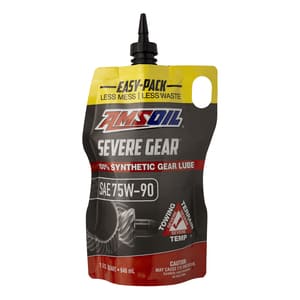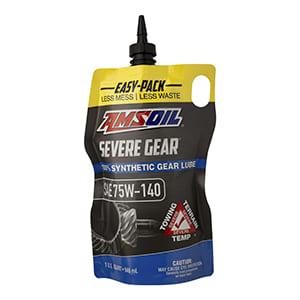Have you ever thought about how crucial the differential and transfer case fluids are for your vehicle’s performance? Keeping these fluids in check isn’t just a minor detail; it can save you from severe mechanical failures and hefty repair bills.
Differentials and transfer cases play pivotal roles in distributing power to your vehicle’s wheels. Over time, the fluids lubricate and cool vital components, preventing wear and tear. Ignoring routine maintenance can lead to gear damage, overheating, and even complete system failure.
You’re looking at significant costs if you neglect these fluids. Picture spending $2,500 on a new transfer case or $1,500 on a differential. It’s a lot, but it’s avoidable with regular fluid changes using high-quality products designed to withstand extreme conditions.
By sticking to a routine maintenance schedule, you not only preserve your vehicle’s longevity but also ensure it performs efficiently. For more detailed advice on choosing the right fluids, check out bestengineoilintheworld.com.

The Importance of Differential and Transfer Case Fluid Maintenance
Maintaining your vehicle’s differential and transfer case fluids is essential. Ignoring this can lead to severe failures and expensive repairs. Differentials and transfer cases help your vehicle run smoothly.
Impact on Vehicle Performance
Keeping your differential and transfer case fluids in check isn’t just about avoiding problems; it’s about making your ride smoother and more efficient. How does it matter? Well, here’s how:
Handling: Properly maintained fluids keep everything running smoothly. When gears are well-lubricated, they work harmoniously, which translates to better handling of your vehicle. You don’t want a clunky ride when you can have a smooth one, right?
Traction: Ever found yourself stuck in a slippery situation? Thanks to the transfer case, power is distributed to all the wheels, giving you better traction. Quality fluid ensures this distribution is efficient, making sure you stay in control even on challenging terrains.
Fuel Efficiency: A well-oiled machine isn’t just a saying; it’s a fact. When your drivetrain components are running smoothly, your engine doesn’t have to work as hard. This means better fuel efficiency, saving you bucks at the pump.
Preventing Costly Repairs
Skipping out on regular maintenance can lead to more than just a bumpy ride; it can hit your wallet hard. Here’s why:
Gear Protection: Differential fluid lubricates the gears, preventing them from rubbing against each other too harshly. Without this, you could be looking at severe gear wear and even breakage.
Heat Management: Overheating is a silent killer of many vehicle components. Differential and transfer case fluids help to manage heat. If these fluids aren’t changed regularly, they lose their effectiveness, leading to overheating and eventual failures.
Contaminant Removal: With time, metal particles and other contaminants can build up in your fluids. Regular changes ensure these harmful bits are flushed out, avoiding internal damage.
In simpler terms, think of it like brushing your teeth. If you skip it, cavities and other dental issues can pile up, leading to expensive trips to the dentist. Regular differential and transfer case fluid changes work similarly, preventing expensive, unforeseen repairs.
Taking care of your vehicle’s differential and transfer case fluids is not just a routine task; it’s a necessity. For more detailed guides and premium products to keep your ride in top shape, head over to bestengineoilintheworld.com.

Signs That It’s Time for a Fluid Change
Maintaining your vehicle’s differential and transfer case fluids is crucial for smooth operation and longevity. Ignoring these fluids can lead to expensive repairs and severe damage. There are signs you can look for that suggest it’s time to change these fluids.
Strange Noises
If you hear unusual noises like grinding, whining, or clunking from your vehicle, it might be time for a differential and transfer case fluid change. These sounds often mean that the gears aren’t properly lubricated, leading to metal-on-metal contact. Over time, this can cause significant wear and tear.
Warning Lights
Modern vehicles come equipped with sensors that can monitor the condition of your fluids. If you see a warning light related to your transmission or drivetrain, it’s a clear indicator that you should check your fluids. Ignoring these warnings can lead to more serious issues down the line.
Fluid Leaks
Leaking fluid is a sure sign of trouble. Check underneath your vehicle for any oil spots or puddles. Leaks can indicate that seals or gaskets are failing, leading to low fluid levels. Low fluid levels can cause overheating and increased friction, resulting in costly repairs.
Difficulty Shifting Gears
If your vehicle struggles to shift gears smoothly, it might be due to degraded transfer case fluid. Proper fluid levels and quality are essential for the seamless operation of your drivetrain. Difficulty in shifting can be stressful, and it’s a clear signal that maintenance is overdue.
Vibration or Jerking
Feeling unusual vibrations or jerking while driving can indicate that your differential or transfer case fluid needs changing. These symptoms often result from insufficient lubrication, causing mechanical parts to operate less smoothly.
Burning Smell
A burning odor coming from your vehicle is a significant warning sign. This smell often means that the fluid is old and degraded, causing it to overheat. If you notice this, it’s time to check and change your fluids immediately to avoid further damage.
Scheduled Maintenance Mileage
Always adhere to your vehicle’s maintenance schedule. Many manufacturers recommend changing the differential and transfer case fluids every 30,000 to 50,000 miles. This recommendation ensures that your vehicle operates efficiently and prevents unexpected breakdowns.
Keeping an eye out for these signs can save you time and money in the long run. Neglecting fluid changes can lead to severe mechanical issues, and the differential and transfer case fluid change cost is far less than major repairs. Stay ahead of potential problems by maintaining your vehicle and following best practices. If you need more information on fluid maintenance, visit bestengineoilintheworld.com for tips and recommendations.

Differential and Transfer Case Fluid Change Cost
When maintaining your vehicle, you can’t afford to overlook the cost of changing differential and transfer case fluids. Regularly updating these fluids is crucial to keep your car running efficiently and avoiding hefty repair bills.
Typical Costs
How much should you budget for this maintenance task? While costs can vary based on location, vehicle type, and whether you do it yourself or hire a professional, here are some general figures:
DIY Costs: If you’re handy with tools, changing the fluids yourself can save money. You’ll spend about $50-$100 on fluid and basic supplies. However, this option may require more time and knowledge.
Professional Services: Taking your vehicle to a mechanic or dealership will cost more due to labor charges. Expect to pay between $150-$300 per differential or transfer case service. Some dealerships might even charge up to $600 for both services combined.
Factors Affecting Cost
Several factors influence the cost of a differential and transfer case fluid change:
Vehicle Type: Luxury or high-performance cars often use specialized fluids, increasing the cost.
Labor Rates: Mechanics in urban areas typically charge more for their services than those in rural settings.
Fluid Quality: Using premium synthetic fluids like AMSOIL may cost more upfront but can offer better protection and longevity.
Service Location: Dealerships usually charge higher rates compared to independent mechanics or service chains.

Is It Worth the Cost?
You might wonder if spending this money is really necessary. Consider the following points:
Preventing Damage: Regular fluid changes protect the gears and other components in the differential and transfer case from wear and overheating.
Avoiding High Repair Bills: Neglected fluids can lead to parts failing, costing much more in repairs. A new transfer case could set you back $2,500, while a differential might cost $1,500 to replace.
Improving Vehicle Performance: Fresh fluids ensure smoother operation, enhancing your vehicle’s overall performance.
Practical Tips
To manage the differential and transfer case fluid change cost more effectively:
Shop Around: Get quotes from multiple mechanics and compare prices.
Use Coupons or Promotions: Look for deals from service shops. Many offer promotions on fluid services.
Check Fluid Quality: Always specify the type of fluid you want, and ensure it meets your vehicle’s requirements.
Keeping an eye on your differential and transfer case fluids not only saves money in the long run but also keeps your vehicle running smoothly. For more detailed information on high-quality fluids, visit bestengineoilintheworld.com.

Benefits of High-Quality Synthetic Gear Oil
When it comes to maintaining your vehicle’s performance, the quality of the fluids you use is crucial. Using high-quality synthetic gear oil can make a big difference in the lifespan and efficiency of your differential and transfer case. Here’s why opting for premium products like AMSOIL SEVERE GEAR® can benefit you.
Features of AMSOIL SEVERE GEAR®
AMSOIL SEVERE GEAR® stands out in the market for several key reasons that make it superior to conventional oils:
High Film Strength: This oil is specifically designed to handle high-load demands. It maintains its viscosity, ensuring long-lasting protection against metal-to-metal contact, which is vital for the longevity of your vehicle’s components.
Extreme Temperature Performance: Whether you’re driving in extreme heat or cold, AMSOIL SEVERE GEAR® excels. It stays stable in both high and low temperatures, providing consistent protection.
Reduced Friction: By reducing friction, this synthetic gear oil helps to lower operating temperatures and improve overall efficiency. Less friction means less wear and tear on your gears.
Shear Stability: Its shear stability means it won’t break down under stress, ensuring you get the full performance benefits for the entire duration of its use.
Ultimate Wear Protection: AMSOIL SEVERE GEAR® offers superior protection against wear, keeping your gears in top condition and preventing costly repairs.
These features make AMSOIL SEVERE GEAR® an ideal choice for those looking to protect their vehicles from the harsh conditions of everyday driving.
Long-term Savings and Performance

Investing in synthetic gear oil may seem like a higher upfront cost, but it pays off substantially in the long run. Here’s how:
Prevents Failures: Synthetic gear oil can help to prevent differential and transfer case failures. These failures can be catastrophic, leading to repair costs that can reach up to $2,500 for a new transfer case and $1,500 for a differential. High-quality oil reduces the likelihood of these costly repairs.
Extended Oil Change Intervals: Synthetic oils generally last longer than conventional oils, meaning fewer oil changes and less frequent maintenance. This translates to reduced overall maintenance costs.
Improved Fuel Efficiency: Because synthetic gear oil reduces friction, it can improve your vehicle’s fuel efficiency. This means you save money on gas over time.
Protection Against Metal Chips and Wear: The superior formulation of AMSOIL SEVERE GEAR® ensures that your gears are well-protected against the formation of metal chips and wear, which are serious indicators of internal damage.
Consistent Performance: Unlike conventional oils that can degrade quickly, synthetic oils like AMSOIL SEVERE GEAR® maintain their protective qualities over a longer period, ensuring that your vehicle performs consistently well.
Using high-quality synthetic gear oil is an investment in your vehicle’s future. It not only helps to keep your differential and transfer case functioning smoothly but also saves you money by reducing the differential and transfer case fluid change cost over the lifetime of your vehicle. Visit bestengineoilintheworld.com for more information on AMSOIL synthetic lubricants.
Conclusion
Differential and transfer case failures are costly and avoidable. Regular fluid changes with high-quality synthetic oils ensure these components run smoothly. Neglecting this maintenance can lead to severe damage and expensive repairs.
Stay proactive with your vehicle care by scheduling routine fluid changes. The investment in quality fluids and timely service far outweighs the differential and transfer case fluid change cost.
For reliable information on premium synthetic lubricants, visit bestengineoilintheworld.com.

![Featured image for "Essential Guide to Differential and Transfer Case Fluid Change Costs [2024 Update]" blog post. Gear transmission.](https://bestengineoilintheworld.com/wp-content/uploads/2024/08/gear-transmission.jpg)